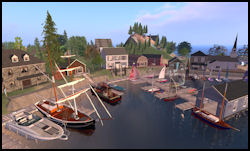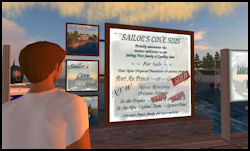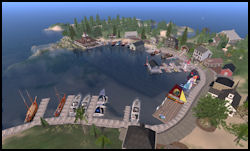Small Ripple at Sailor’s Cove: Attorney Bob Brackman on a Second Life Lawsuit Avoided
August 2nd, 2008 by Benjamin Duranske
 I recently came across a press release issued by the law firm of Brackman and Brackman (via Galelio Law, a companion blog to the Virtual Worlds Law Library), announcing the confidential settlement of a business conflict amongst avatars. According to the parties, the dispute, over a Second Life property called “Sailor’s Cove,” ended amicably. I thought VB’s readers would be interested in the process, and Bob Brackman, one of the attorneys involved, was kind enough to answer some questions by email.
I recently came across a press release issued by the law firm of Brackman and Brackman (via Galelio Law, a companion blog to the Virtual Worlds Law Library), announcing the confidential settlement of a business conflict amongst avatars. According to the parties, the dispute, over a Second Life property called “Sailor’s Cove,” ended amicably. I thought VB’s readers would be interested in the process, and Bob Brackman, one of the attorneys involved, was kind enough to answer some questions by email.
Banner & Witcoff, a well-known IP firm on the other side of this dispute, also issued a press release (.pdf) regarding the settlement, but I’d briefly met Bob Brackman at the Virtual Law Conference in New York last Spring and I wanted an excuse to talk to him again, so he’s featured. No slight intended; I hope to catch the Banner & Witcoff guys for the next one.
Virtually Blind: Thanks for taking the time to talk to VB’s readers, Bob. First, I understand you’ve got a background in criminal law?
 Bob Brackman: I began my legal career almost 30 years ago as an organized crime prosecutor in New York State. I also served as an Inspector General, and as New York City’s Deputy Commissioner for Investigations.
Bob Brackman: I began my legal career almost 30 years ago as an organized crime prosecutor in New York State. I also served as an Inspector General, and as New York City’s Deputy Commissioner for Investigations.
VB: But you’re in private practice now, and I understand your firm represented a Second Life land owner who needed to rely on the real life legal system in order to resolve a business dispute with other avatars in Second Life?
Bob Brackman: That’s right. My client, who goes by ‘Patrick Leavitt’ in SL has owned and operated Sailor’s Cove for a few years now. Two of his former estate managers alleged that they were not employees or volunteers, but full partners in the organization. When all of them “fell out of favor” with each other, Patrick’s estate managers told him they were entitled to two-thirds of the value of the entire estate — now over twenty-one Sims and several voids.
VB: Was your client actually sued in our real world courts?
BB: No, no papers were ever filed. I was fortunate that opposing counsel (representing the other two people behind their avatars) was a reasonable and skilled attorney, and between us we were able to craft a confidential agreement that put the matter to rest and satisfied all of the parties. Had the case gone to litigation, we both agreed the most likely jurisdiction would have been the State of California.
VB: What was at the heart of the legal dispute?
 BB: The other two avatars, the estate managers, had met my client some time ago, shared the same enthusiasm for sailing and offered to help him grow and develop Sailor’s Cove into the really attractive region it is today. While the parties “chatted” from time to time about becoming partners, there was a “falling out” along the way before any such business relationship came to be. While opposing counsel argued that their significant, uncompensated work for my client in and of itself might be viewed under the California Corporations Code as an enforceable partnership, my review of those same statutes led me to the opposite conclusion.
BB: The other two avatars, the estate managers, had met my client some time ago, shared the same enthusiasm for sailing and offered to help him grow and develop Sailor’s Cove into the really attractive region it is today. While the parties “chatted” from time to time about becoming partners, there was a “falling out” along the way before any such business relationship came to be. While opposing counsel argued that their significant, uncompensated work for my client in and of itself might be viewed under the California Corporations Code as an enforceable partnership, my review of those same statutes led me to the opposite conclusion.
VB: So had it gone to court you think your client would have prevailed?
BB: Nobody ever knows what’s going to happen once that judge takes the bench. That’s why if you can settle a matter, while not sacrificing the best interests of your client, it’s usually the better, less expensive way to go. But I think we had a lot of law on our side — add to that its application to a virtual dispute in a virtual world… we’ll just have to keep watching until there is some litigation and case law begins to shape the legal future of the virtual world.
VB: Are you suggesting that even a small (by dollar value) settlement portends somehow of the proliferation of heavier regulation of SL activities by real world lawmakers?
 BB: Absolutely. Just as in the real world, when conduct that may offend community standards, or even offensive conduct that the community wants to protect — when those in the position to regulate are given the opportunity they will do what they do best — pass a law! Our laws regulating contracts, oral or written, partnership agreements — the kinds of issues at the heart of my client’s case date all the way back to Common Law England and before — society demands predictability, so we regulate our conduct in order to provide a level playing field and generally predictable sense of the consequences that will flow from different forms of human interaction. If you were to multiply my client’s case by the hundreds in SL, or take the conflict on a more complex and far more risky (financially) level into the corporate boardroom, you are going to see local, state, federal and even international regulators sit up and take notice — SL and other virtual worlds should not get too comfortable with what has been a so far laissez faire approach.
BB: Absolutely. Just as in the real world, when conduct that may offend community standards, or even offensive conduct that the community wants to protect — when those in the position to regulate are given the opportunity they will do what they do best — pass a law! Our laws regulating contracts, oral or written, partnership agreements — the kinds of issues at the heart of my client’s case date all the way back to Common Law England and before — society demands predictability, so we regulate our conduct in order to provide a level playing field and generally predictable sense of the consequences that will flow from different forms of human interaction. If you were to multiply my client’s case by the hundreds in SL, or take the conflict on a more complex and far more risky (financially) level into the corporate boardroom, you are going to see local, state, federal and even international regulators sit up and take notice — SL and other virtual worlds should not get too comfortable with what has been a so far laissez faire approach.
VB: Wouldn’t you agree though that laws we have already passed to govern a myriad of conduct in the real world are adequate to address most of the potential virtual world business fraud, civil and criminal conduct and any other types of virtual wrongdoing?
BB: They are, with the exception perhaps of some “tweaking” that will be born from some of the current litigation going on now and future cases yet to be brought. But the missing component in SL is enforcement. A good law, a good regulation, designed to protect the public interest — virtual or not — is nothing more than an expression of the people’s desire without a strong enforcement component behind it.
VB: What are your own plans for involvement in SL, and virtual law in general?
BB: Well, we are going to continue to try and provide quality legal services to virtual residents when they need the force of real world law to protect their interests. I’ve also, under the SL name of ‘Solvur Quandry,’ established a little “beachhead” in world to prepare for the level and complexity of the oversight issues I think we are going to be facing sooner than later — an enterprise called TRENCHCOAT INVESTIGATIONS. I would not be surprised in the not too distant future if the SL equivalents of Enron, Tyco, WorldCom, etc. finding themselves at the receiving end of the government’s, or a federal judge’s admonition that future viability will be difficult to attain without the services of an honest broker, a tour guide through a jungle of statutes, regulations, ordinances and rules in all forms that haven’t even been written yet.
VB: Anything else you’d like to add?
BB: TRENCHCOAT INVESTIGATIONS is still in the nursery, and as we evolve along with SL and our other legal colleagues, together I hope we will find common sense ways of living in this new reality we’ve created: as usual, the stuff of science fiction…we must all now learn to share our worlds with the machines we’ve built!
Until Bob likes how his avatar, ‘Solvur Quandry’ looks (he promises within the next few weeks) he can be reached via email at bob@brackmanandbrackman.com. TRENCHCOAT INVESTIGATIONS is decorating its office space, and enjoying its new neighbors down at Sailor’s Cove.
Related Posts on Virtually Blind
- Linden Lab Takes Big Step Toward Private Legal Systems and Governments in Second Life: "In a surprisingly underreported move of huge significance to the long..." (5 comments)
- Futuristic Hypothetical on Virtual Property: "U.K. website bitrealty.com (which appears, primarily, to resell real..." (8 comments)
- The Legality of the Virtual World’s Oldest Profession: "The Second Life Herald has an article up that beat me to some..." (16 comments)
One Response to “Small Ripple at Sailor’s Cove: Attorney Bob Brackman on a Second Life Lawsuit Avoided”
Leave a Reply
Notes on Comments: Your first comment must be manually approved, but after it is you'll be able to post freely with the same name and email. You can use some HTML (<a> <b> <i> <blockquote> etc.) but know that VB's spam blocker holds posts with five or more <a> links. VB supports gravatars. Got a gravatar? Use the associated email and it'll show with your comment. Need one? Set it up for free here.



There are a great many disputes of this nature out there – many of them far smaller in value than this: as Brackman points out, in-world enforcement being lacking, it can be expensive to resolve in-world disputes proportionate to the value at stake, except in large disputes such as this one.